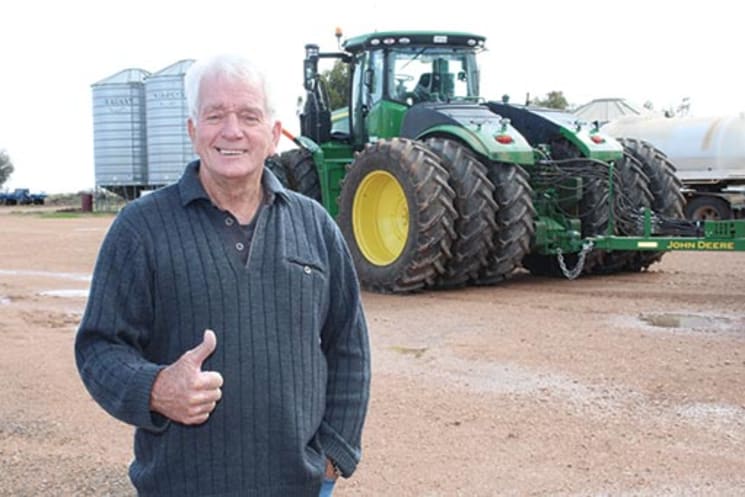
Mallala canola farmer and Adelaide Plains councillor John Lush hopes the end to SA’s GM crop moratorium will bring with it better results for local farmers. PHOTO: Sam Bradbrook
LOCAL councils have been given the power to apply to remain genetically-modified (GM) crop-free as part of a deal to lift a 16-year ban on its cultivation.
The State Government reached an agreement with Labor last week to pass legislation which would end South Australia’s moratorium on GM crops, which has stood since 2004.
To push the legislation through, the State Government permitted Labor amendments which would allow local councils to apply to keep their area GM-free following consultation with farmers, stakeholders and the community.
Primary industries minister Tim Whetstone would then have the final say on the application.
Mallala canola farmer and Adelaide Plains councillor John Lush, who has long been an advocate of GM crop cultivation, said the trade-offs the State Government accepted to get the bill through are worth it.
“As farmers, we make decisions on what to grow based on what the market potential is and what profit we can make on the crop,” he said.
“We won’t grow GM unless there’s a market for it and having studied world markets for GM for a long time I realise 90 per cent of the markets we sell to will accept GM.
Councils will have six months to apply to Mr Whetstone to have the GM ban remain in their areas. Local government’s wishing to lift the moratorium do not need to apply through the State Government.
Light Regional Council Mayor Bill O’Brien said while his chamber had yet to discuss GM crops, it could be a “divisive” issue for the community.
“We’re not going to dig our heels in and take a position on this at this time, we’re going to listen to the people,” he said.
“Agriculture is such an important element of our region, so we’re going to listen very carefully that’s for sure.
“We’ve got to organise how we do that listening. We’ll have residents which, in many cases, will have strong views, and they should have their views listened to and considered.
“It’s going to be a very difficult decision for us I believe. I would be surprised if all the community came together and said ‘all of us think it’s a great idea’.”
With the 2020 planting season already underway, farmers will have to wait until next year to cultivate their first paddocks of GM crops.
Mr Lush said councils should look at the GM debate through a “market focus” lens, and push “emotion” to one side.
“The real issue for elected members on council is to actually understand the issue for a start. Most of them would have never studied GM crops and marketplace.
“There will still be some that will be emotionally opposed for reasons we’ve seen over the past ten years, particularly from some extreme groups.
“It’s not about emotion or the science because that’s already been proven. It’s only about the market.”
GM deal signals end to political tug-of-war
THE deal to lift South Australia’s 16-year ban on cultivating genetically modified (GM) crops brings an end to a political back-and-forth on the issue dating back to March last year.
The State Government on three separate occasions changed introduced new legislation and changed regulations to lift the moratorium, but were subsequently blocked in the upper house by Labor, SA-BEST and the Greens.
The first attempt came in August last year, when Primary Industries minister Tim Whetstone announced the ban would be lifted with a ministerial regulation, and was subsequently shut down in November after a disallowance motion from Green legislative council member Mark Parnell was supported by Labor and SA-BEST.
Two similar situations followed just prior and just after Christmas, leaving farmers uncertain on the legality of planting GM paddocks.
Now, Labor has promised to support new legislation, with amendments, introduced to parliament last week and vote against another Greens-led disallowance motion.
Mr Whetstone said the agreement was a “great outcome” for farmers.
“After 16 years and millions of dollars in lost economic and research opportunities, it is a historic day for farmers in this state who can look forward to the choice in what they want to grow,” he said.
“Lifting the moratorium will not only provide economic benefits for our farmers but it will put South Australia on a level playing field with every other mainland state in Australia which has had access to GM technology for at least a decade.”
A report released in March of last year revealed SA farmers had lost $33 million as a result of the moratorium, and could lose a further $5 million if extended to 2025.
Opposition primary industries spokesperson Eddie Hughes said Labor “never doubted” the science behind GM.
“The bipartisan approach will benefit primary producers in our state while also providing a voice for those people that still have concerns about GM crops,” he said.
“Today’s resolution proves just how important SA Labor’s role has been in the GM debate. It further cements that SA Labor is effectively influencing government’s policy and we have done this in a pragmatic and responsible way.”
During the political debate over the ban, SA-BEST attempted to pass its own legislation to end the moratorium, but it was rejected.
Mr Parnell was vocally opposed to any GM cultivation across the state. In a statement last week he said Labor had “capitulated” to the State Government.
“Labor’s collusion with the Liberals will also inevitably result in crop contamination for neighbouring farmers,” he said.
“Most farmers do not want to grow GM crops, yet the cost of contamination will fall on their shoulders.”



